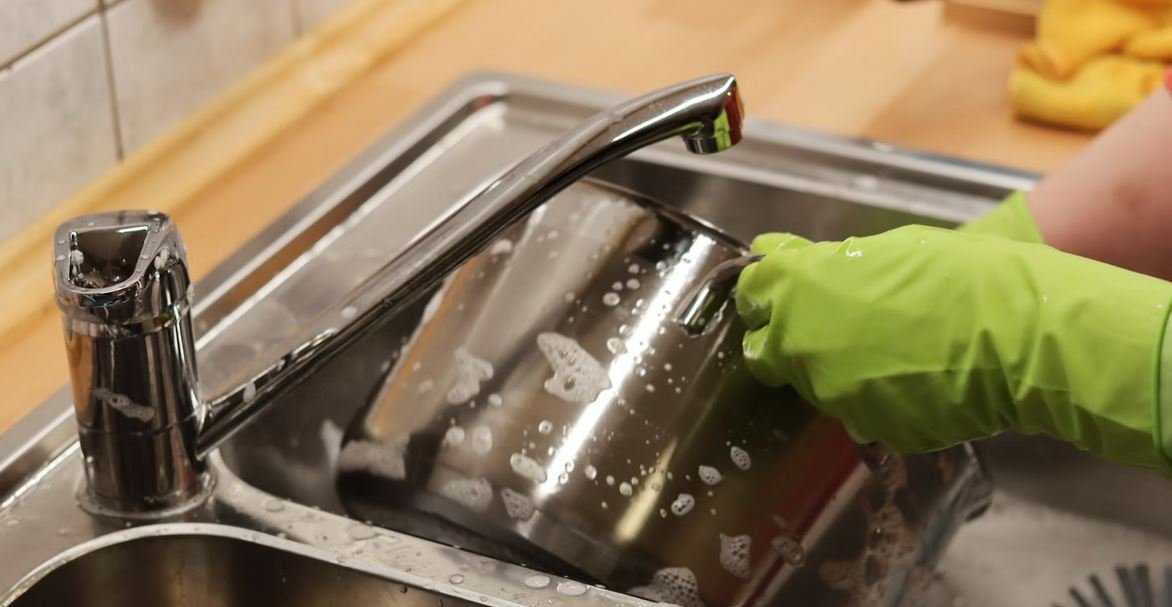Can You Use Magic Eraser On Dishes? (Explained)
Magic Erasers are known for getting rid of tough stains on walls, countertops, and even shoes—but what about dishes?
If you've ever been tempted to grab one to scrub off stubborn food residue or stains on your dishes, you might want to think twice. While they’re great for cleaning, they’re also more abrasive than they look, which could cause problems for your dinnerware.
In this post, I’ll explain why you shouldn’t use Magic Erasers on dishes.
Can You Use Magic Eraser On Dishes?
No, it's not a good idea to use a Magic Eraser on dishes you eat from.
These sponges are made from melamine foam, which works like super-fine sandpaper. That means it can wear down the surface of your plates, bowls, and cups over time.
Plus, as you scrub, tiny particles can break off (nothing toxic), but probably not something you want mixing with your food.
Also Read: Can I Use A Magic Eraser On Leather?
Why You Shouldn't Use Magic Eraser On Dishes
Let’s take a closer look at why you might want to think twice before grabbing that eraser next time you’re cleaning your dishes:
Not Food-Safe
Magic Erasers aren’t considered food-safe.
While they can clean surfaces really well, they’re not meant for contact with food. They’re made with chemicals that can leave behind residue. It’s a bit like using a cleaner that doesn’t rinse off properly.
The last thing you want is any chemicals hanging around your plates, cups, or utensils, especially when you’re about to eat.
Can Scratch Surfaces
Magic Erasers are great for tough stains, but they can be harsh on some surfaces. If you’re cleaning delicate dinnerware like fine china, tiny scratches might start to appear over time.
That’s because Magic Erasers are mildly abrasive, and while they scrub away grime, they can leave marks on more fragile items.
The same goes for non-stick cookware or coated surfaces—using a Magic Eraser too often can wear away the protective layer, ruining the surface.
So while they’re effective, it’s a good idea to use them carefully, especially on items you want to keep looking pristine.
Also Read: Magic Eraser Ruined Finish
Wears Down Coatings
This is another reason why you shouldn’t use Magic Erasers on non-stick pots or pans.
Non-stick coatings are delicate, and over time, the abrasive nature of Magic Erasers can gradually wear them down. Not only does this damage the surface of your cookware, but it could also cause the release of harmful chemicals into your food.
This is something you definitely want to avoid.
Since non-stick pans are valued for making cooking and cleanup easier, it’s best to steer clear of anything that could strip away those coatings.
What To Use Instead On Dishes
Now that we’ve covered why you probably shouldn’t use Magic Erasers on dishes, let’s talk about what you can use. There are plenty of safe and effective alternatives:
Baking Soda And Water
Baking soda is perfect for cleaning dishes.
It’s natural, safe, and works wonders at lifting stains and odors. It’s great for those times when you have stuck-on food or stubborn stains that regular dish soap can’t tackle.
To use it, just make a paste with a little water and apply it to any stubborn spots. Gently scrub with a sponge or cloth, and rinse well.
Baking soda also acts as a mild abrasive, so it’ll gently scrub without scratching or damaging your dishes. Plus, it’s a great option for things like coffee mugs that develop stubborn stains from regular use.
You won’t have to worry about leaving any harmful residue behind, and it’s safe for pretty much any dishware.
Also Read: Dishes Smell After Hand Washing
White Vinegar And Dish Soap
White vinegar is another amazing option that’s tough on grime but gentle on your dishes.
When combined with a little dish soap, it can work wonders on greasy or soapy buildup.
Just mix a small amount of white vinegar with warm water and a drop of dish soap. Use this solution to soak your dishes for a few minutes before scrubbing away with a sponge.
White vinegar’s acidity helps break down grease and remove stains, while the dish soap helps cut through the gunk. And don’t worry—it won’t leave a strong vinegar smell behind.
Once you rinse everything off, your dishes will be sparkling clean and free of any residue.
Lemon And Salt
If you’re looking for something that smells nice and gets the job done, lemon and salt make a great combo.
Lemon juice is a natural acid that can help cut through grease, while salt acts as a gentle abrasive to scrub away tough stains. It’s great for cutting through buildup, especially on cutting boards or glassware.
To use it, just cut a lemon in half, sprinkle some salt on the exposed side, and rub it directly onto the stained area.
The salt will scrub away any grime while the lemon’s acidity helps break down the stain.
Plus, it leaves your dishes smelling fresh!
Bottom Line
Don’t use Magic Erasers on your dishes. They can leave behind chemical residue, scratch surfaces, and even wear down coatings.
There are plenty of safe, natural alternatives to get your dishes looking their best without any of the risks.
So, next time you're facing a stubborn stain or bit of grease, skip the Magic Eraser and grab something safer. Your dishes—and your health—will thank you!

